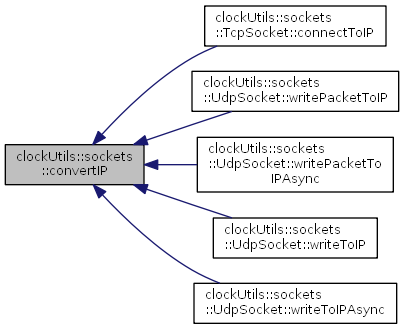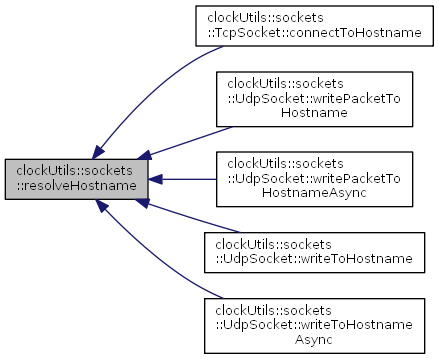Namespaces | |
| clockUtils | |
| clockUtils::sockets | |
| std | |
Macros | |
| #define | CLOCK_SOCKETS_API |
Typedefs | |
| typedef uint32_t | clockUtils::sockets::IPv4 |
| typedef int32_t | socklen_t |
| typedef int32_t | socklen_t |
Functions | |
| CLOCK_SOCKETS_API IPv4 | clockUtils::sockets::resolveHostname (const std::string &hn) |
| returns the IP for a given hostname More... | |
| CLOCK_SOCKETS_API IPv4 | clockUtils::sockets::convertIP (const std::string &ip) |
| converts an IP in the numbers-and-dots notation into an IPv4 integer More... | |
| CLOCK_SOCKETS_API std::string | clockUtils::sockets::convertIP (const IPv4 &ip) |
| converts an IPv4 formatted IP to the numbers-and-dots notation More... | |
Variables | |
| const IPv4 | clockUtils::sockets::NO_IP |
Detailed Description
The sockets library can be used to easily create socket connections in an efficient way
How to use the sockets library
TCP sockets
You need to include this header
To connect two TcpSockets you need two parts. The first part is a host which is waiting for connections, mostly a server. In this example you will see a simple echo server just returning all messages he got sent adding the string " RESPONSE!". A server using TcpSockets can look like this:
And the client side of this example looks like this:
Every method of TcpSocket will return ClockError::SUCCESS on success or otherwise an error code. The message received in client will now like like "REQUEST? RESPONSE!".
UDP sockets
You need to include this header
A UdpSocket works a bit different than the TcpSocket because it doesn't create a connection between to sockets. But the API is mostly the same. Here is the same example as for the TcpSocket:
And the client side of this example looks like this:
Macro Definition Documentation
§ CLOCK_SOCKETS_API
| #define CLOCK_SOCKETS_API |
Definition at line 40 of file socketsParameters.h.
Typedef Documentation
§ IPv4
| typedef uint32_t clockUtils::sockets::IPv4 |
§ socklen_t [1/2]
| typedef int32_t socklen_t |
Definition at line 45 of file UdpSocket.h.
§ socklen_t [2/2]
| typedef int32_t socklen_t |
Definition at line 45 of file TcpSocket.h.
Function Documentation
§ convertIP() [1/2]
| CLOCK_SOCKETS_API IPv4 clockUtils::sockets::convertIP | ( | const std::string & | ip | ) |
converts an IP in the numbers-and-dots notation into an IPv4 integer
- Parameters
-
[in] ip to be converted
- Returns
- the IP or NO_IP if ip was not well-formed
- Note
- Because of the underlaying function, the ip "255.255.255.255" equals NO_IP, thus converting this ip will appear like an error

§ convertIP() [2/2]
| CLOCK_SOCKETS_API std::string clockUtils::sockets::convertIP | ( | const IPv4 & | ip | ) |
converts an IPv4 formatted IP to the numbers-and-dots notation
- Parameters
-
[in] ip IPv4 address
- Returns
- the readable version as a string
§ resolveHostname()
| CLOCK_SOCKETS_API IPv4 clockUtils::sockets::resolveHostname | ( | const std::string & | hn | ) |
returns the IP for a given hostname
- Parameters
-
[in] hn Hostname to resolve
- Returns
- the IP or NO_IP upon failure

